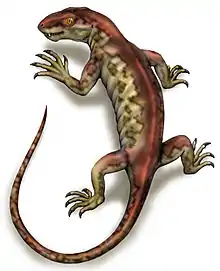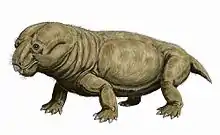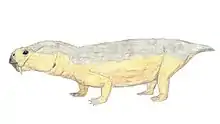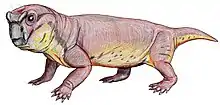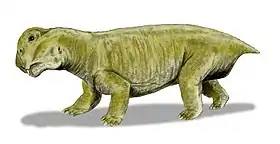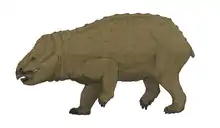Emydopoidea
Emydopoidea is a group of Late Permian dicynodont therapsids. It includes the small-bodied Emydops, Myosaurus, and kingoriids, and the burrowing cistecephalids.[1] Below is a cladogram from Kammerer et al. (2011) showing the phylogenetic relationships of emydopoids:[2]
| Therochelonia |
| ||||||||||||||||||||||||||||||||||||||||||||||||||||||||||||||||||
| Emydopoidea Temporal range: Late Permian - Middle Triassic | |
|---|---|
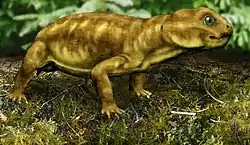 | |
| Restoration of the emydopoid Myosaurus gracilis | |
| Scientific classification | |
| Kingdom: | Animalia |
| Phylum: | Chordata |
| Clade: | Therapsida |
| Clade: | †Dicynodontia |
| Clade: | †Therochelonia |
| Superfamily: | †Emydopoidea Cluver and King, 1983 |
| Subgroups | |
|
See text. | |
References
- Kammerer, C.F.; Angielczyk, K.D. (2009). "A proposed higher taxonomy of anomodont therapsids" (PDF). Zootaxa. 2018: 1–24.
- Kammerer, C.F.; Angielczyk, K.D.; Fröbisch, J. (2011). "A comprehensive taxonomic revision of Dicynodon (Therapsida, Anomodontia) and its implications for dicynodont phylogeny, biogeography, and biostratigraphy". Journal of Vertebrate Paleontology. 31 (Suppl. 1): 1–158. doi:10.1080/02724634.2011.627074.
This article is issued from Wikipedia. The text is licensed under Creative Commons - Attribution - Sharealike. Additional terms may apply for the media files.
